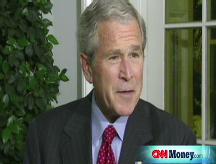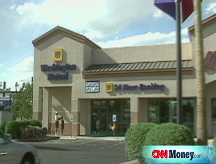Oil prices slip on fresh demand worries
Crude futures fall as uncertainty about the proposed $700 billion bailout plan and the collapse of Washington Mutual resurrect economic concerns.

NEW YORK (CNNMoney.com) -- Oil prices retreated Friday as the largest bank failure in the nation's history and uncertainty about the fate of the $700 billion bailout raised fresh concerns about the economy.
As Wall Street waits for clarity as to when relief should arrive from Washington, and the economy continues to sag, demand for oil will remain weak, sending oil prices lower.
"Oil traders see what is happening and if the deal does not get cobbled together, the demand side of the equation for gas and crude could be impaired," said Tom Orr, director of research at Weeden & Co., financial services firm.
Oil fell $1.13 to settle at $106.89 a barrel. On Thursday, crude futures for November delivery settled up $2.29 to $108.02 as the oil market focused on the way that the bailout plan would work to devalue the dollar.
Crude oil is traded in dollars around the world, and so a devalued dollar means that crude oil becomes more expensive in dollar terms.
Economy, demand: But as oil prices resumed their slide Friday, inflationary concerns took a back seat to the continued collapse of the economy, which was initially weakened by the meltdown of the housing industry.
There were hopes that the $700 billion bailout plan that President Bush announced Saturday in an attempt to loosen credit on Wall Street would be passed quickly. However, a proposed settlement fell through Thursday when Congressional Republicans raised objections.
"There is a lot of concern about the rescue package. People had hoped that it would be in place by the weekend," said Orr.
On Thursday, when oil traders were optimistic that a deal would be approved imminently, crude prices rallied.
"Oil is watching the negotiations in Washington," said Andrew Lebow, a broker at MF Global in New York. "As we lurch back and forth between deal and no deal, the market has been affected."
But the inability of key lawmakers to reach an agreement was one more sign that the already beleaguered economy may have to weather through a prolonged period of distress.
With oil prices lower on Friday, "the market is trying to anticipate what the ramifications would be of no near term deal or no deal at all," said Lebow. If there were no deal reached, and the economy was left to right itself, "there is a good bet that prices would deteriorate," added Lebow.
On Friday, President Bush made a brief televised statement promising a rescue plan will pass.
Oil prices will "continue to be under a lot of pressure until this deal gets done," said Orr. "Every day that goes by with a delay in this package is another day that companies are choked off from liquidity."
Federal regulators seized Washington Mutual (WM, Fortune 500) and announced Thursday night that JP Morgan Chase (JPM, Fortune 500) had acquired the bank's $307 billion in assets and $188 billion in deposits. The acquisition marks another sting in a biting chain of failures on Wall Street in the past couple weeks, pulling into focus just how weak the U.S. economy has become.
The longer the economy remains under high stress and credit markets stay frozen, the weaker demand for oil becomes.
Supply concerns: Oil hit a record high of $147.27 a barrel on July 11, but has fallen more than $40 since as weak demand has overpowered otherwise significant supply concerns.
As crude prices have come off their recent highs, so have retail gas prices. According to a nationwide survey of credit card swipes at gasoline stations, prices at the pump dropped for the ninth consecutive day. The average price of unleaded regular dropped 1.7 cents to $3.683 a gallon, according to the survey released Friday by motorist group AAA.
Hurricanes Gustav and Ike both smashed through the Gulf of Mexico, shutting down the production and refinery rich region for a period. Recovery in the region has been slow. As of Friday, 59.3% of crude oil production remained shut in and 56.4% of natural gas production remained closed down in the region, according to the Department of Energy. And refinery capacity was limited by 656,500 barrels because 3 refineries in Texas were still shuttered.
In the wake of the storms, stockpiles of crude oil and gasoline both fell last week. According to the Energy Information Administration's weekly supply report, stockpiles of gasoline fell by 5.9 million barrels and at 178.7 million barrels, reserves were at their lowest level since 1990, when the weekly supply data became available. In addition, refinery capacity last week was at its lowest level on record, with refineries only running at 66.7% of their operable capacity.
Violence in Nigeria has continued, with Movement for the Emancipation of the Niger Delta (MEND) rebel groups threatening pipelines and limiting oil supplies from the region. ![]()





